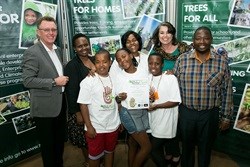
Top stories






LegalKenyan court postpones case seeking to halt Diageo's $2.3bn sale of EABL
Duncan Miriri and Emma Rumney 2 days
More news











EduPlant is a leading school food gardening and greening programme that's co-ordinated by Food & Trees for Africa. Since its inception in 1994, it has provided educator and community workshops, and produced educational materials. It also offers this competition element.
This year's EduPlant competition drew over 400 entrants. Of these, 60 schools were shortlisted and attended a three-day seminar, in which they participated in a variety of entertaining and educational workshops, including: drumming, t-shirt painting, permaculture workshops, paraffin safety and child safety.

KwaZulu-Natal schools took first place in three out of five categories, winning cash and gardening tools. Roseway Waldorf School in Botha's Hill won the EduPlant emerging category for 2014. Winner of the intermediate category was Siphakemile Primary School in Port Shepstone and the advanced category winner was Izwi Lesizwe Primary School in Pietermaritzburg.
Nobanda Primary School in Pietermaritzburg won the provincial category for the KZN region.
Tasneem Sulaiman-Bray, Engen's GM of Corporate Affairs, says, "As a sponsor of the EduPlant programme since 2010, and an active participant since 1994, Engen is proud to be a part of a sustainable and socio-economically meaningful programme of this stature; a programme which has helped to create a new generation of eco-savvy entrepreneurs."
Over the past 20 years, EduPlant has helped thousands of schools enhance food security, contribute to poverty alleviation in their communities, improve local nutrition and develop more sustainable land and resource management. It continues to provide life skills and practical hands-on learning to young people, teaching them how to address their own nutritional needs as well as those of their surrounding communities.